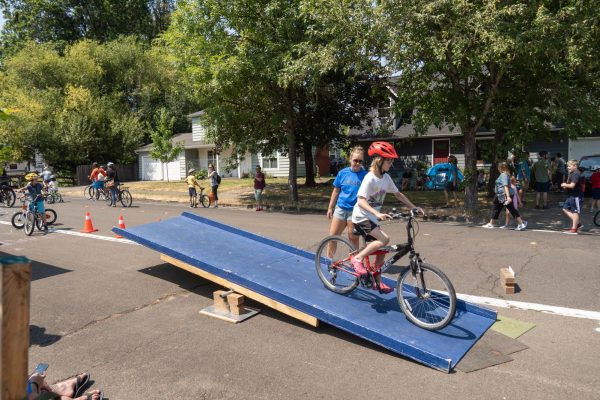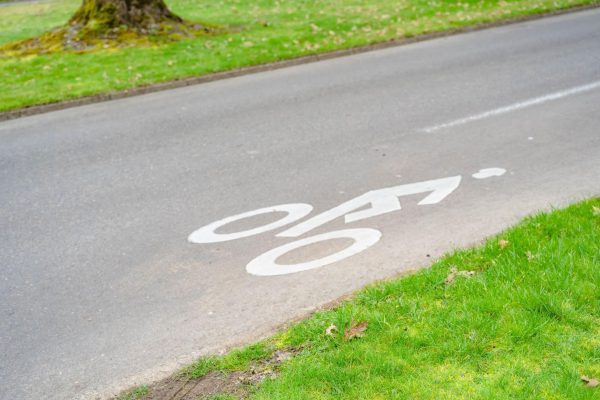Campus dispatch center prioritizes OSU community
May 2, 2022
Since Oregon State University created its own police department in January 2021, the university has now created its own Level 2 dispatch center that takes 911 calls.
According to Teresa Parker, dispatch manager, OSU’s dispatch center was a unique opportunity to focus strictly on OSU’s safety.
The dispatch calls received at Public Safety are strictly for the OSU community, Parker said, although the university also works together with other resources in Corvallis Ore., such as hospitals and fire departments.
“Our response times are generally very quick because we are able to deploy resources and focus on our campus,” Parker said. “We are able to give a higher level of customer service because our only focus is the campus.”
Shanon Anderson, chief of police and associate vice president for Public Safety, said the dispatch center monitors the blue emergency light alarms across campus and notifies the responsible party if one is triggered.
“We also provide assistance for medical calls and have the training and equipment to start to stabilize many medical emergencies prior to our partners with the Corvallis Fire Department arriving,” Anderson said. “We also receive calls from concerned family and friends to check on individuals, here on the Corvallis campus, that they have concerns for.”
According to Parker, someone wanting to become a dispatcher needs to be 18-years-old and either be a high school graduate or in possession of a GED.
“You go through the two-week experience at the Police Academy in Salem, Ore. and that’s where you get basic call-taking knowledge,” Parker said. “You come back to the university and sit with a trainer for approximately three months. During that period of time, they help hone skills and help people identify resources that are local and specific to the university. Probation or trial period is six months.”
During this training, Parker said employees also get trained on the emotional aspects of handling dispatch calls.
“We learn how to listen, we’re taught how to help you communicate valuable information in a timely manner,” Parker said. “We learn how to help you effectively respond to emergency situations and how to deliver essential aid to others.”
Both campus safety and the dispatch center work closely with the community, to ensure safety, security and a positive experience.
“A big part of building a relationship and partnership within our community is having people understand who we are and that we’re people too,” Parker said.
According to Parker, being a dispatcher is a highly rewarding job and their main goal is to help people.
“When somebody calls in and they’re having a difficult day or they’re experiencing an emergency, mental health, stolen bike… The dispatchers here are the first person who talks to them, and get to help them through the process and get them the resources that they need,” Parker said. “It’s rewarding for us.”
Being a dispatcher can be emotionally draining on both ends, according to Parker. Although the dispatchers are trained, it can be hard to let go of a call.
“We feel, we cry and we rejoice right along with you but you’d never know we carry those emotions around with us,” Parker said. “Our callers don’t see us face-to-face so it is easy to forget we go through the same trauma our caller goes through. We only get to hear the first part of the story so it’s like watching a movie and then the TV turns off before the ending.”
Stephanie Howard, dispatch supervisor and communications officer, said the OSU police department is different from others.
“I feel like it used to be more punishmentbased,” Howard said. “I think we’ve done a really good job of having it be growth-based and education-based. I think that’s a really important shift that I’ve seen in my time here.”
Although being a dispatch worker is rewarding, according to Howard, she’s learned how to not take home things that are difficult.
“I’ll ask for a debrief to help with the emotional piece of it,” Howard said.
Howard said she wants people to focus on the positive and rewarding aspects of the work they’re doing.
“I feel like we focus a lot on how it can be emotionally draining, but I take a lot of calls where I get to help people, and there’s a successful, positive end to it,” Howard said. “It’s not always a bad end.”
According to Anderson, the OSU and Corvallis communities are both interested in public safety.
“We look forward to working with, and supporting all community members, and to being great partners,” Anderson said. “If you feel like you need us, or if you feel like someone else is in need, please call us. We may not be the solution, but we will work hard to help you find a solution and to find a way to feel safe.”
























































































































